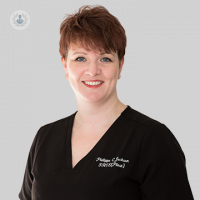Surgery for breast asymmetry: Expert insight on the available options
Written in association with:Breast asymmetry is perfectly natural but drastic differences in the appearance of the breasts can affect women’s confidence and self-esteem. In this informative guide for patients, highly respected consultant plastic surgeon Miss Philippa Jackson sheds light on the various surgical approaches which can be used to correct breast asymmetry.

How common is breast asymmetry?
Breast asymmetry, which refers to a difference in size, shape, or position between the two breasts, is actually quite common. In fact, it is estimated that nearly half of all women have some noticeable degree of breast asymmetry.
This can range from a minor difference in size or shape to a more significant asymmetry. It is important to note that mild breast asymmetry is totally normal and is not a cause for concern. However, if you notice a sudden or significant change in breast size or shape, you should see a specialist for evaluation and advice.
Breast asymmetry can occur during normal development and puberty, as breasts may grow at different rates or have different shapes. Other factors that can contribute to breast asymmetry include hormonal changes, pregnancy, breastfeeding, weight fluctuations, and ageing. In some cases, breast asymmetry may also be attributed to certain medical conditions or prior breast surgeries.
Some women find that the asymmetry affects their confidence and they may wish to consider surgery to correct the difference. With a specialist plastic surgeon, you can discuss your individual goals and evaluate the available options to help you reach a decision about whether treatment is right for you.
How can breast asymmetry be addressed with surgery?
Surgical correction of breast asymmetry can be achieved in various ways, depending on the nature and severity of the asymmetry.
Breast augmentation
If the asymmetry is primarily due to differences in breast size, breast augmentation with implants can be performed. Implants of different sizes can be used to achieve a more balanced appearance. The surgeon will carefully assess the breasts and recommend the appropriate implant sizes to achieve symmetry.
Breast reduction
In cases where one breast is significantly larger than the other, a breast reduction may be performed on the larger breast to match the size of the smaller breast. This procedure involves removing excess breast tissue and skin, and reshaping the breast to achieve a more symmetrical result.
Breast lift
If the asymmetry is primarily related to sagging or drooping breasts, a breast lift (mastopexy) can be performed. This procedure involves repositioning the breast tissue, removing excess skin, and lifting the breast to a higher position. The surgeon may also adjust the shape and size of the breast during the procedure to improve symmetry.
Fat transfer
In some cases, fat transfer may be used to address breast asymmetry. This procedure involves removing fat from one part of the body (such as the abdomen or thighs) through liposuction and transferring it to the smaller breast to improve volume and symmetry.
Combination procedures
Depending on the specific needs of each individual case, a combination of the above procedures may be recommended to achieve the desired breast symmetry. This allows the surgeon to personalise the treatment according to the patient's unique circumstances and goals.
If you are considering breast asymmetry surgery and wish to schedule a consultation with Miss Philippa C Jackson, you can do so by visiting her Top Doctors profile.


